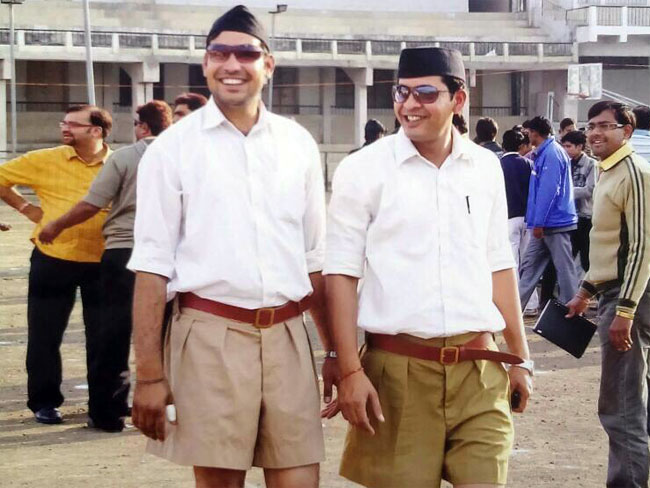Indore, Jul 19: A strange twist of fate or tactical disassociation? A man who based his work on the teachings of the RSS has been abandoned by the organisation while he is in the middle of a major corruption expose.

Anand Rai, a doctor from Indore, considered instrumental in blowing the lid off the Vyapam scam in Madhya Pradesh, feels let down by the Hindutva organisation with which he had been affiliated since 2005. “If the Sangh can stand up for terror accused Pragya Bharti, who has brought public disgrace to the organisation, then why did it abandon me when I was exposing Vyapam?” asks Dr. Rai.
The relation between him and the Sangh took a dramatic turn in 2013 when the Vyapam scam came to light and Dr. Rai was projected as the key whistleblower. Following this, the Sangh distanced itself from him and stopped inviting him to its programmes and weekly workshops. The 2012-13 Nanaji Deshmukh award for social service, named after the RSS ideologue, for which he was recommended was also held back.
“They did not want anything to do with the controversy. Maybe to avoid making it appear as if RSS men were taking on the BJP government,” said Dr. Rai.
He feels that while the Sangh defends its “bad crop”, it does nothing for “honest karyakartas.”
The RSS “claims to fight for corruption, but till now has Mohan Bhagwat said a word on Vyapam,” Mr. Rai asks. “Is this deadly scam a lesser issue than Article 370 or the uniform civil code they claim to fight for?”
Backed by a strong footing in student politics, the doctor started his association with the Sangh in 2005, when he was designated the president of the BJP doctors’ cell in Indore. Not only did he regularly don the khaki shorts to attend shakhas and archana karyas, he held the prominent position of district vice-president of Arogya Bharti, the medical wing of the RSS. His proximity to RSS Indore vibhag pramukh Pramod Jha was an indication of his association with the outfit.
But now hounded and threatened for his efforts in exposing the culprits in the Vyapam scam, Dr. Rai faces fresh harassment as information leaked to him suggests that the State government plans to transfer him to the tribal belt of Dhar, a “punishment posting”. Senior State officials are pressuring Dr. Rai’s senior to relieve him of his post, and warned him not to allow the doctor give interviews to the media anymore.
Dr. Rai believes it is part of a sustained effort to demoralise him. His wife, Gauri, a gynaecologist, was recently suspended for seeking child-care leave. Though she was reinstated, she was transferred to Ujjain even as other doctors suspended along with her were promoted, Dr. Rai says. “We have a two-and-a half-year-old child to look after. What is the government trying to prove by transferring me? That this is the reward you get for exposing corruption?” he asks.
A meritorious student since his school days, Mr. Rai was born into the family of a schoolteacher in a small village Mahendra in Harda district. Possessing a sharp mind, he got an early sniff into the irregularities in medical education in the State in 1993 when the Geology paper he attempted in the Pre-Medical Test was leaked in Gwalior. His subsequent involvement in student politics and participation in exposing graft cases and raising incidence of partiality against students of Hindi-medium groomed his skills.
In 2005, his suspicions peaked while attempting the MD/MS exams. He was baffled to find that many of the top qualified students belonged to the same hostel block. “These were students with a poor educational record but from influential families, their fathers holding high bureaucratic posts,” said Mr. Rai, who began digging deep for evidence. Initially, his complaints yielded little. On July 5, 2009, the break came as he tipped off the Crime Branch about the presence of few impersonators lodged in an Indore hotel. Later that year, on his complaint, a committee was formed to identify the impersonators in fudged exams. But despite filing RTI queries he got no response.
In 2010, he was even fired from the Maharana Yashwant Rao Hospital in Bhopal for instigating student agitation and exposing the regulatory manner of clinical trials in the hospital. But in 2011, with the help of independent MLA Paras Saklecha, Mr. Rai managed to raise the issue in the State Assembly and it was found that 114 impersonators had been identified. The lid was off, and till 2012, 295 impersonators were found leading to some arrests. This also led to death threats by the accused.
DMAT scam worse
But undeterred, Mr. Rai is now eyeing exposing corruption in private colleges. He recently filed a petition in the Supreme Court demanding that the Vyapam CBI probe be extended to seat allotments through DMAT exam in private colleges. While hearing his petition, the apex court said the DMAT scam seems worse than Vyapam. Mr. Rai says there is a clear link between the corruption in Vyapam and DMAT. The same solvers who would impersonate for candidates in Vyapam also filled in seats in private colleges but later surrendered the seats which were then sold out.





Comments
Add new comment